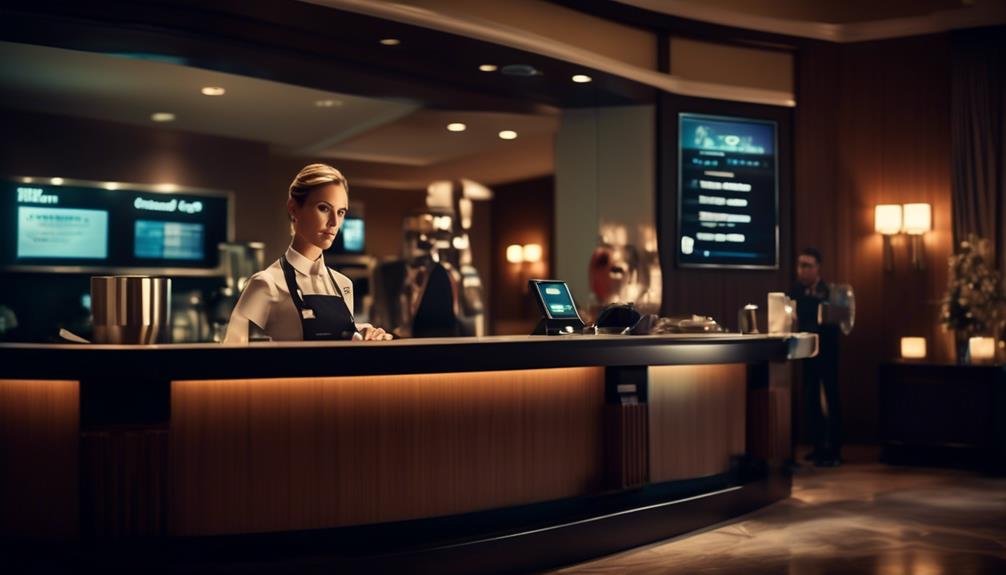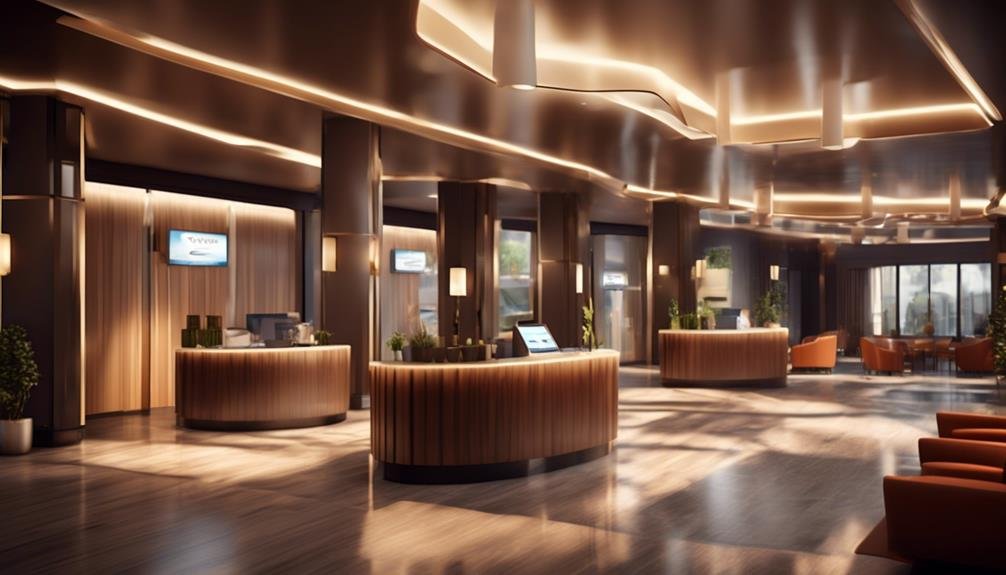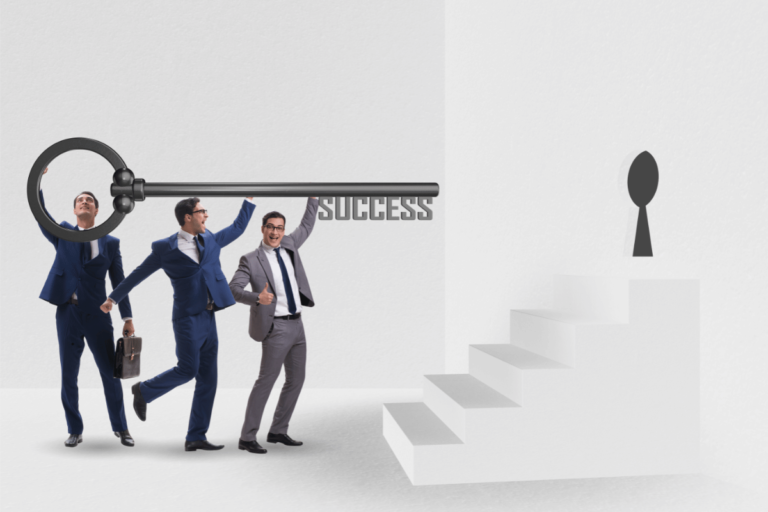Fostering Innovation in the Hospitality Industry
In the hospitality industry, it's been reported that 72% of hoteliers believe that innovation is critical for the future success of their business.
But what does fostering innovation really entail? How can you stay ahead in an industry that is constantly evolving?
In this discussion, we'll explore the key strategies and approaches that leading hospitality businesses are using to drive innovation and gain a competitive edge.
From embracing technology to enhancing guest experiences, there are numerous avenues to explore in fostering innovation, and the potential impact on your business is significant.
Key Takeaways
- Innovation is critical for the future success of the hospitality industry, with 72% of hoteliers recognizing its importance.
- Impact assessment is essential to measure the effects of innovative practices on customer satisfaction, operational efficiency, and overall business performance.
- Embracing technology is crucial for gaining a competitive advantage in the industry, as it streamlines operations, enhances guest experiences, and improves efficiency.
- Cultivating a culture of creativity is key to fostering innovation at all levels of operations, by empowering employees to contribute ideas and promoting collaboration among teams.
Understanding the Impact of Innovation
Understanding the impact of innovation is crucial for assessing the effectiveness of new strategies and technologies in the hospitality industry. Impact assessment allows you to measure the effects of innovative practices on customer satisfaction, operational efficiency, and overall business performance. By embracing an innovation mindset, you can proactively identify opportunities for improvement and stay ahead of the competition.
It's important to constantly evaluate the impact of innovation on your business to ensure that it aligns with your organizational goals and enhances the guest experience.
When conducting impact assessments, consider both quantitative and qualitative measures to gain a comprehensive understanding of how innovation is influencing your business. Look at key performance indicators such as revenue growth, customer retention rates, and employee satisfaction, as well as gathering feedback from guests and staff members. This holistic approach will provide valuable insights into the real impact of your innovative initiatives.
Embracing Technology for Competitive Advantage
You need to embrace technology to stay ahead in the competitive hospitality industry.
Integrating tech solutions can streamline operations, leading to improved efficiency and cost savings.
Digital guest experiences can also set you apart, enhancing customer satisfaction and loyalty.
Tech Integration for Efficiency
Embracing technology for competitive advantage in the hospitality industry requires a strategic integration of innovative tech solutions for operational efficiency and enhanced guest experiences.
- Integration Challenges
- Overcoming legacy systems and infrastructure hurdles
- Ensuring seamless compatibility and data synchronization
- Operational Benefits
- Streamlining check-in processes and guest services
- Enhancing communication and collaboration among staff
Integrating tech solutions presents challenges such as overcoming legacy systems and ensuring compatibility. However, the operational benefits are significant, including streamlined check-in processes and improved communication among staff.
Digital Guest Experience
Digital guest experience plays a pivotal role in gaining a competitive advantage through technology integration in the hospitality industry.
By embracing personalized communication, hotels can cater to individual guest preferences, enhancing their overall experience.
Seamless check-in processes, enabled by digital platforms, streamline the arrival experience, allowing guests to bypass long queues and paperwork. With mobile check-in and keyless entry, guests can conveniently access their rooms, providing a frictionless experience from the moment of arrival.
Additionally, digital platforms enable hotels to gather guest feedback in real-time, allowing for immediate issue resolution and personalized service adjustments.
Embracing technology for the digital guest experience not only enhances operational efficiency but also fosters customer loyalty by delivering tailored and convenient experiences, ultimately setting your establishment apart in the competitive hospitality landscape.
Cultivating a Culture of Creativity

To foster a culture of creativity in the hospitality industry, organizations must prioritize and encourage innovation at every level of their operations. This involves fostering an environment that embraces fresh perspectives and encourages creative collaboration.
To achieve this, consider the following:
- Encourage Idea Generation
- Empower employees at all levels to contribute ideas for improvement and innovation.
- Establish regular brainstorming sessions or suggestion boxes to gather diverse insights and ideas.
Cultivating a culture of creativity also involves actively promoting creative collaboration among teams. Encouraging cross-departmental collaboration and providing platforms for sharing ideas can spark innovative solutions to challenges.
Enhancing Guest Experiences Through Innovation
Fostering a culture of creativity in the hospitality industry can significantly enhance guest experiences through innovative approaches and solutions. One key area for enhancing guest experiences is through the strategic use of technology. By integrating advanced technology, such as mobile apps for seamless booking and check-in, interactive in-room tablets for personalized service requests, and virtual reality experiences for immersive destination previews, you can elevate the overall guest satisfaction. These technological advancements not only streamline operations but also create a more convenient and engaging experience for guests.
In addition to enhancing technology, innovation in guest experiences can also be achieved through personalized services that cater to individual preferences. Utilizing data analytics and artificial intelligence can enable hotels to anticipate guest needs, providing tailored recommendations and personalized experiences. Whether it's suggesting local activities based on previous preferences or customizing room amenities, these innovative approaches can significantly enhance guest satisfaction.
Furthermore, incorporating sustainable practices and eco-friendly initiatives can also contribute to enhancing guest experiences. Guests today are increasingly conscious of environmental impact, and by integrating sustainable practices into the guest experience, hotels can appeal to environmentally conscious travelers and ensure a positive and memorable stay.
Driving Operational Efficiency With Innovative Strategies

Achieving operational efficiency in the hospitality industry can be significantly enhanced through the implementation of innovative strategies that streamline processes and optimize resource utilization. To drive operational efficiency with innovative strategies, consider the following:
- Process Optimization and Automation
- Implement automated check-in and check-out systems to reduce waiting times and streamline the guest arrival and departure process.
- Integrate inventory management systems that automatically track and reorder supplies, minimizing the risk of stockouts and overstocking.
- Resource Utilization and Optimization
- Utilize energy-efficient technologies such as smart thermostats and LED lighting to reduce utility costs while maintaining guest comfort.
- Adopt predictive analytics to forecast demand and adjust staffing levels and resource allocation accordingly, preventing understaffing or overstaffing.
Overcoming Challenges and Risks in Innovation
You need to address the challenges of risk management strategies and the barriers to innovation adoption in the hospitality industry.
It's important to explore how failure can be a valuable learning experience in the context of innovation.
Risk Management Strategies
One effective approach to mitigating the challenges and risks associated with innovation in the hospitality industry is to proactively develop and implement robust risk management strategies.
To proactively manage risks, consider implementing the following proactive risk mitigation measures:
- Conduct thorough risk assessments to identify potential challenges and develop contingency plans.
- Engage with industry experts to gain insights into emerging risks and best practices for risk management.
- Utilize technology solutions to monitor and mitigate potential risks in real-time, such as implementing data analytics for predictive risk management.
Innovation Adoption Barriers
Identifying and addressing the key barriers to innovation adoption is crucial for navigating the challenges and risks associated with implementing new technologies and practices in the hospitality industry. Overcoming resistance to change is a significant barrier faced when fostering innovation in this sector. It often stems from employees' reluctance to embrace new processes and technologies. To combat this, cultivating an innovation mindset among staff is essential. Encouraging a culture that values creativity, experimentation, and continuous improvement can help break down resistance and promote a more open approach to change. Below is a table summarizing common barriers and strategies to overcome them:
| Barriers | Strategies |
|---|---|
| Resistance to change | Cultivate innovation mindset among staff |
| Lack of resources | Invest in staff training and development |
| Risk of failure | Pilot new initiatives on a small scale |
Failure as Learning
In the hospitality industry, embracing failure as a learning opportunity is key to overcoming challenges and risks in innovation. It's essential to understand that failure is a natural part of the innovation process. By embracing failure, you can develop resilience and adaptability, essential traits for navigating the ever-evolving landscape of the hospitality industry.
Here's how failure can contribute to your learning and growth:
- Learning from Mistakes
- Acknowledge and analyze the reasons behind the failure to gain valuable insights for future endeavors.
- Cultivating Resilience
- Embracing failure fosters resilience, enabling you to bounce back stronger and more determined.
Conclusion
As you continue to foster innovation in the hospitality industry, remember that embracing creativity and technology is the key to staying ahead of the competition.
Just like a well-oiled machine, your innovative strategies will drive operational efficiency and enhance guest experiences.
Keep pushing boundaries and breaking new ground, because in the ever-changing landscape of hospitality, innovation is the fuel that propels success.







